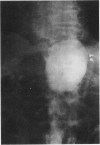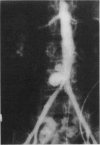Abstract
Infected (mycotic) aortic aneurysms are infrequent and, without surgical intervention, usually lead to uncontrolled sepsis or catastrophic hemorrhage. Symptoms are frequently absent or non-specific during the early stages, and a high index of suspicion is essential to make the diagnosis. Surgery performed after rupture carries high morbidity and mortality rates. Bacterial endocarditis with streptococcus pyogenes was the most common cause of infected aortic aneurysm in the pre-antibiotic era. Today, arterial trauma due to iatrogenic manipulation and depressed immunocompetence have become more common risk factors. Staphylococcus aureus and Salmonella are the most frequent bacteria identified. The authors' recent experience in six patients with infected aortic aneurysms who underwent arteriography and computed tomography was reviewed and these diagnostic methods compared. Computed tomography was found to be more sensitive in the diagnosis of the early stages of the disease, allowing for follow-up by serial scans in a noninvasive and less costly manner. Successful treatment, in four of these patients, was accomplished by aneurysmal resection and extra-anatomic bypass or in situ prosthetic reconstruction. A higher clinical awareness of this disease, leading to early computed tomography evaluation and prompt surgical intervention under appropriate and intensive antibiotic therapy, appears to offer the best chance of survival in patients with this difficult condition.
Full text
PDF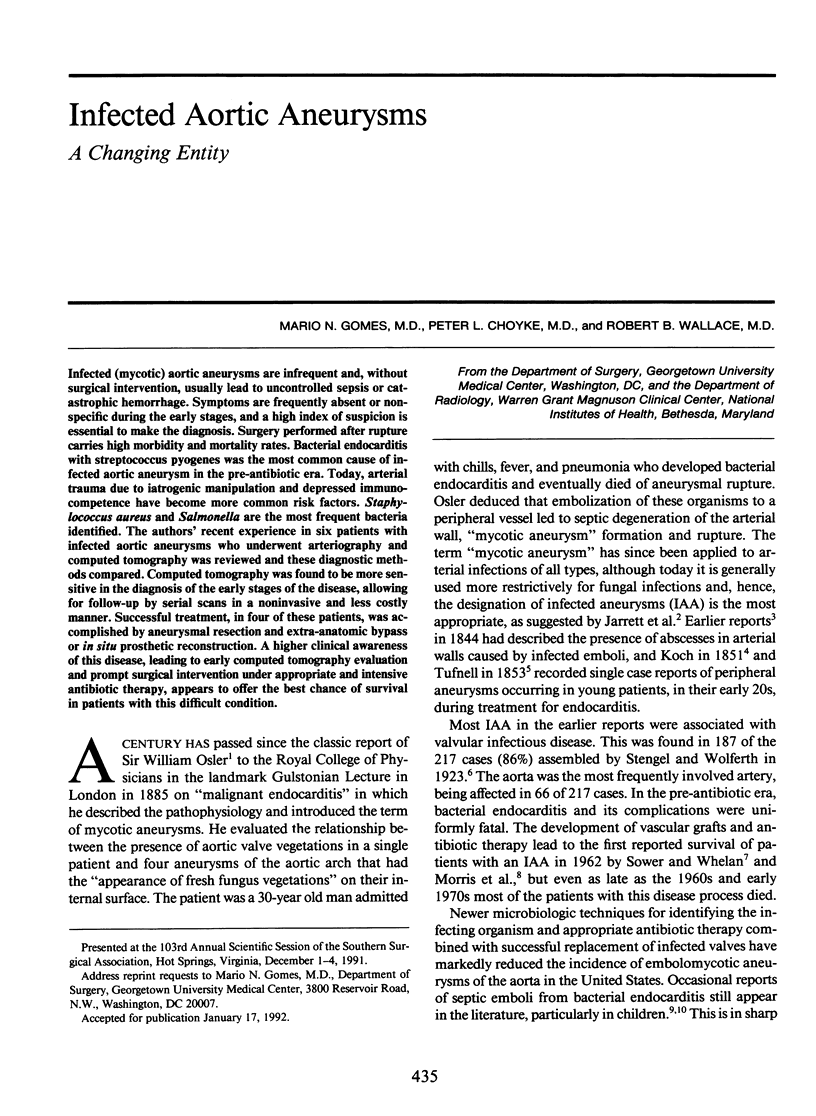
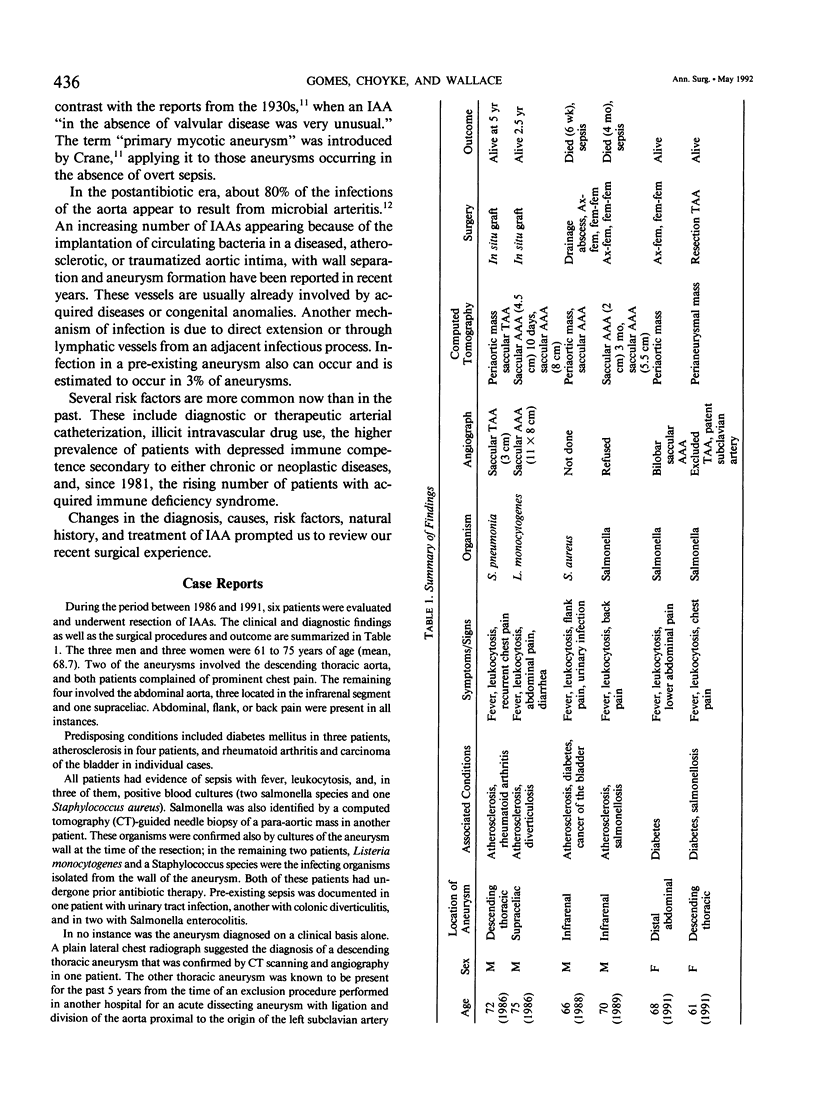
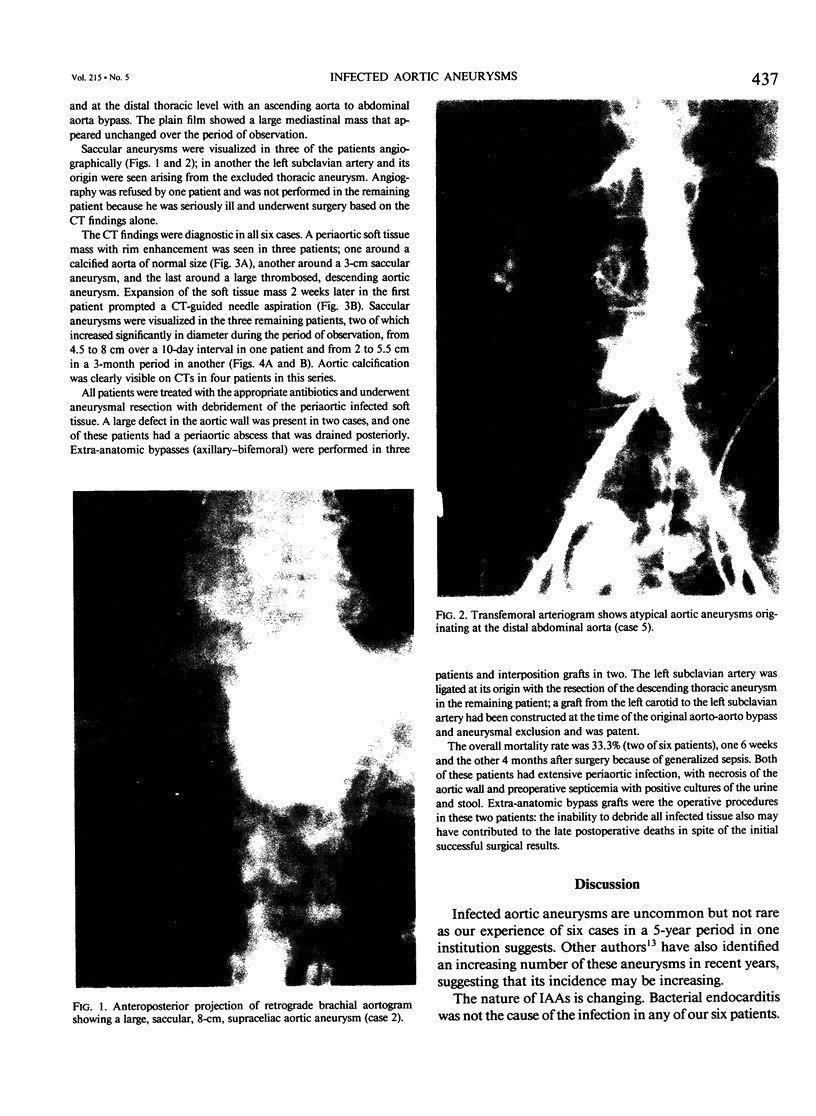
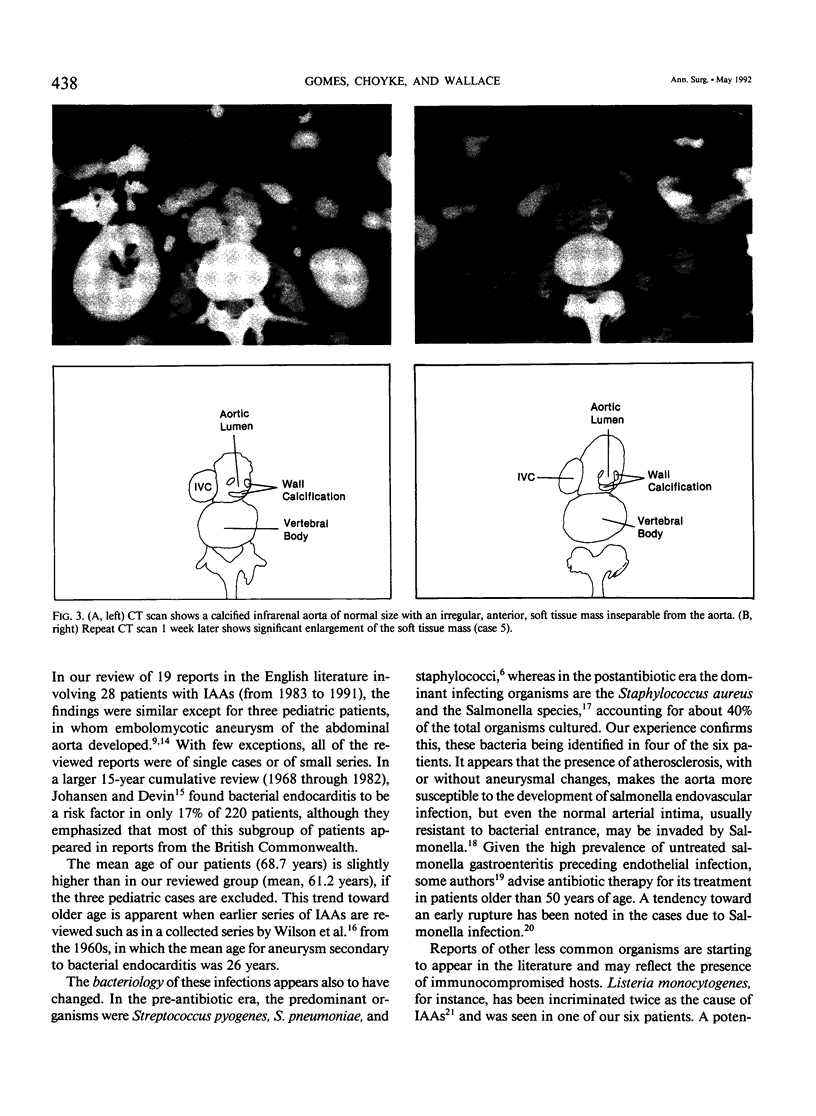
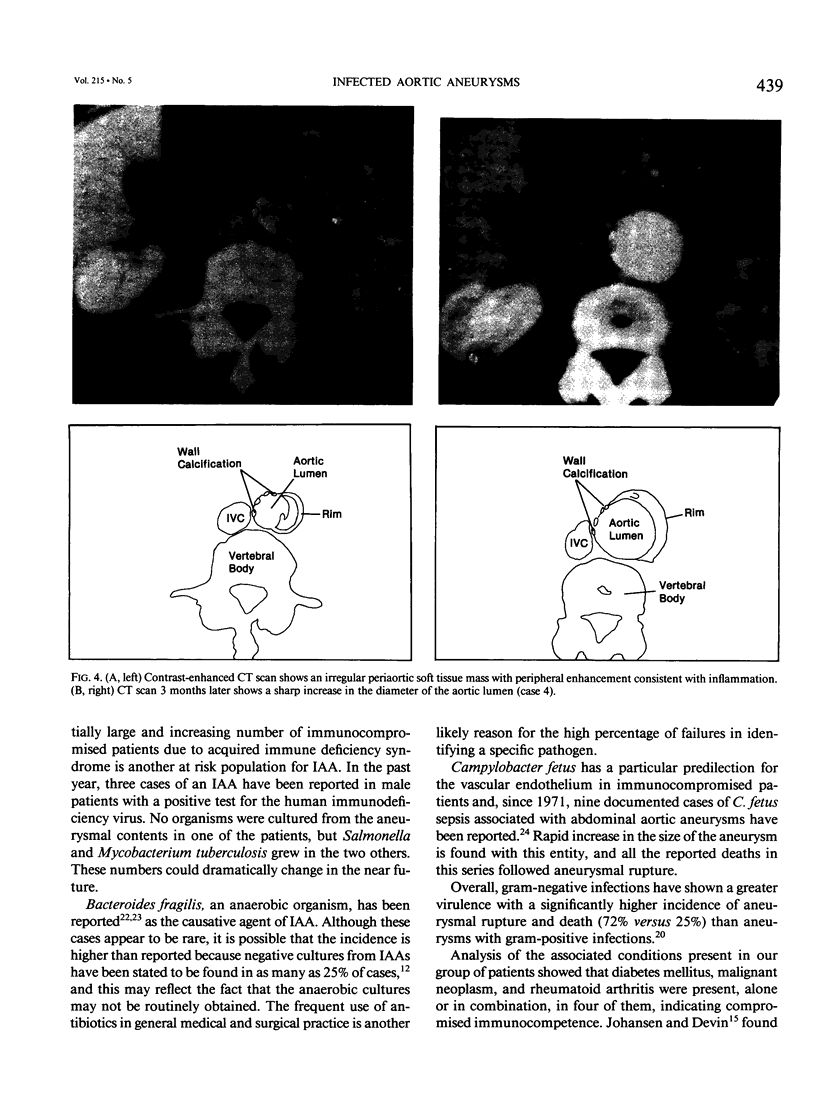
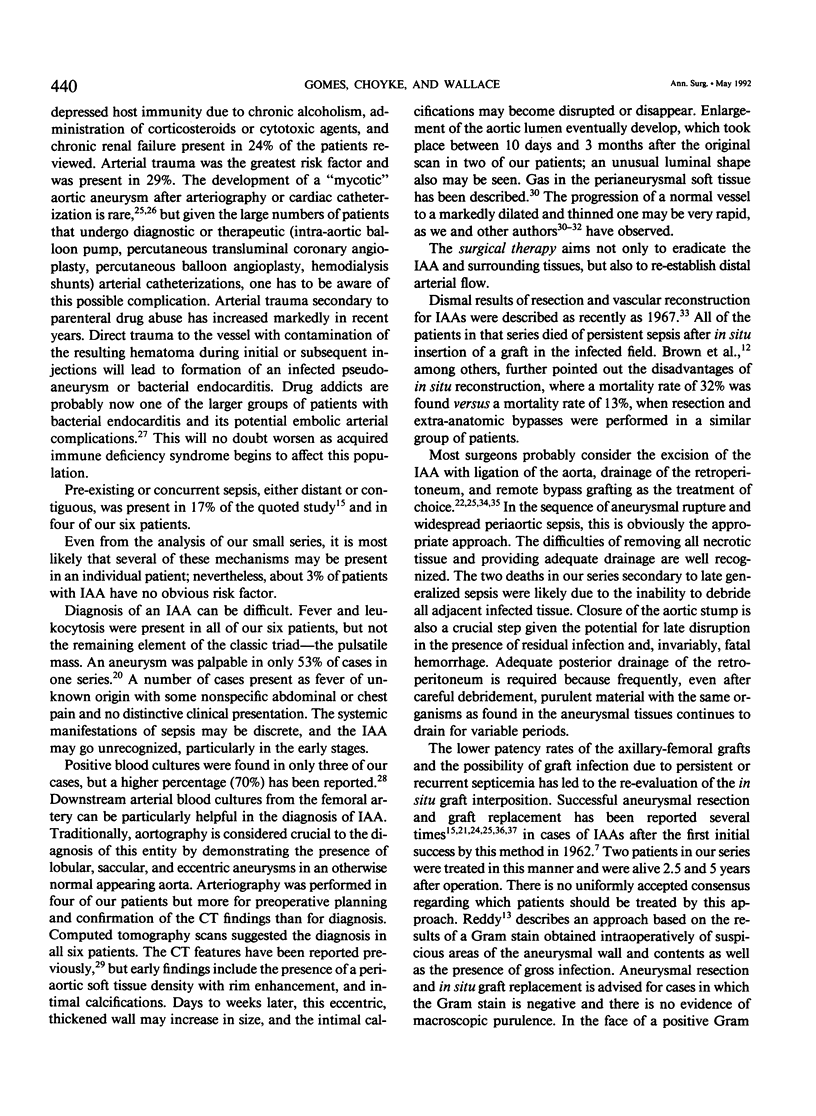
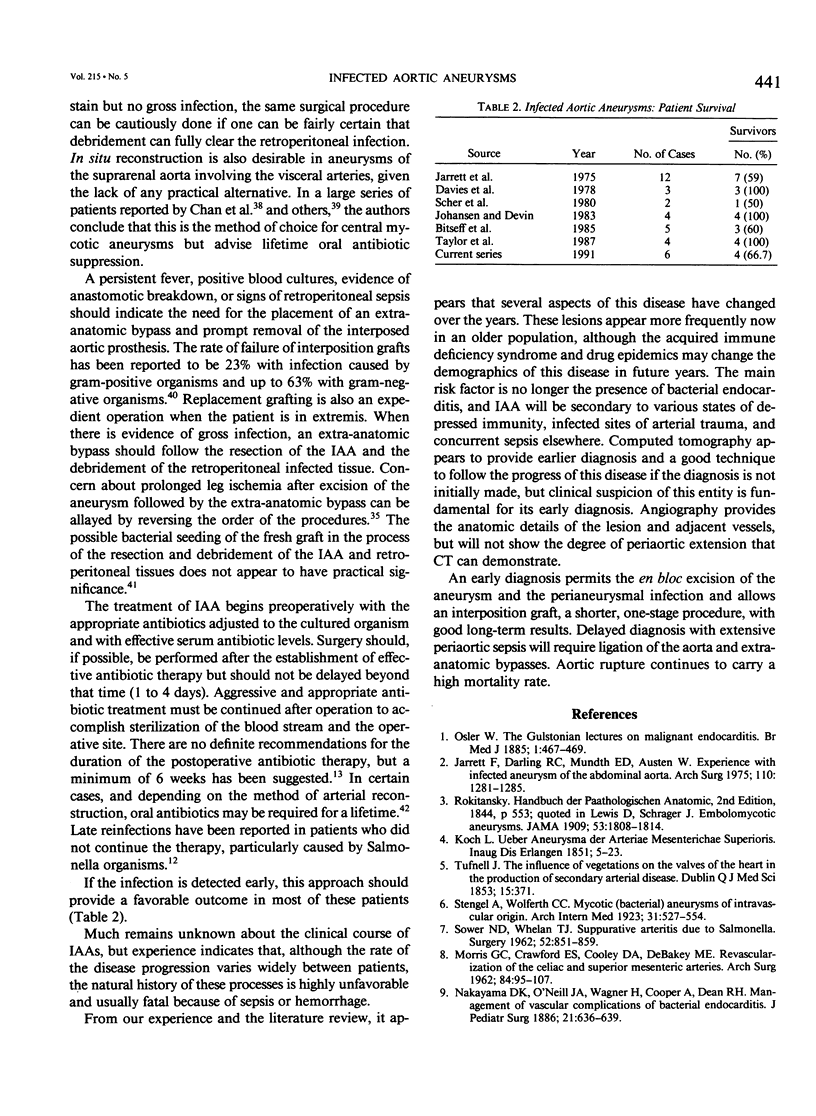
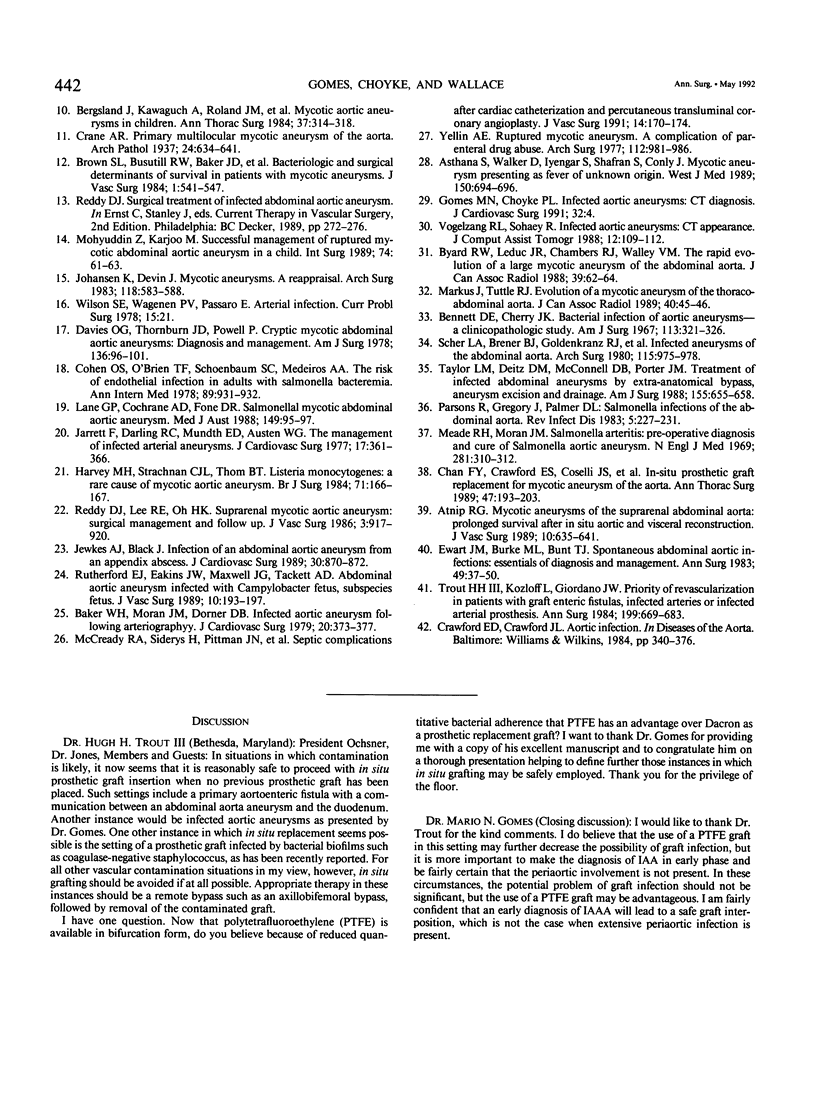
Images in this article
Selected References
These references are in PubMed. This may not be the complete list of references from this article.
- Asthana S., Walker D., Iyengar S., Shafran S., Conly J. Mycotic aneurysm presenting as fever of unknown origin. West J Med. 1989 Jun;150(6):694–696. [PMC free article] [PubMed] [Google Scholar]
- Atnip R. G. Mycotic aneurysms of the suprarenal abdominal aorta: prolonged survival after in situ aortic and visceral reconstruction. J Vasc Surg. 1989 Dec;10(6):635–641. [PubMed] [Google Scholar]
- Baker W. H., Moran J. M., Dorner D. B. Infected aortic aneurysm following arteriography. J Cardiovasc Surg (Torino) 1979 Jul-Aug;20(4):373–377. [PubMed] [Google Scholar]
- Bennett D. E., Cherry J. K. Bacterial infection of aortic aneurysms. A clinicopathologic study. Am J Surg. 1967 Mar;113(3):321–326. doi: 10.1016/0002-9610(67)90273-5. [DOI] [PubMed] [Google Scholar]
- Bergsland J., Kawaguchi A., Roland J. M., Pieroni D. R., Subramanian S. Mycotic aortic aneurysms in children. Ann Thorac Surg. 1984 Apr;37(4):314–318. doi: 10.1016/s0003-4975(10)60737-0. [DOI] [PubMed] [Google Scholar]
- Brown S. L., Busuttil R. W., Baker J. D., Machleder H. I., Moore W. S., Barker W. F. Bacteriologic and surgical determinants of survival in patients with mycotic aneurysms. J Vasc Surg. 1984 Jul;1(4):541–547. [PubMed] [Google Scholar]
- Byard R. W., Leduc J. R., Chambers R. J., Walley V. M. The rapid evolution of a large mycotic aneurysm of the abdominal aorta. Can Assoc Radiol J. 1988 Mar;39(1):62–64. [PubMed] [Google Scholar]
- Chan F. Y., Crawford E. S., Coselli J. S., Safi H. J., Williams T. W., Jr In situ prosthetic graft replacement for mycotic aneurysm of the aorta. Ann Thorac Surg. 1989 Feb;47(2):193–203. doi: 10.1016/0003-4975(89)90268-3. [DOI] [PubMed] [Google Scholar]
- Cohen P. S., O'Brien T. F., Schoenbaum S. C., Medeiros A. A. The risk of endothelial infection in adults with salmonella bacteremia. Ann Intern Med. 1978 Dec;89(6):931–932. doi: 10.7326/0003-4819-89-6-931. [DOI] [PubMed] [Google Scholar]
- Davies O. G., Jr, Thorburn J. D., Powell P. Cryptic mycotic abdominal aortic aneurysms: diagnosis and management. Am J Surg. 1978 Jul;136(1):96–101. doi: 10.1016/0002-9610(78)90207-6. [DOI] [PubMed] [Google Scholar]
- Ewart J. M., Burke M. L., Bunt T. J. Spontaneous abdominal aortic infections. Essentials of diagnosis and management. Am Surg. 1983 Jan;49(1):37–50. [PubMed] [Google Scholar]
- Harvey M. H., Strachan C. J., Thom B. T. Listeria monocytogenes: a rare cause of mycotic aortic aneurysm. Br J Surg. 1984 Feb;71(2):166–167. doi: 10.1002/bjs.1800710239. [DOI] [PubMed] [Google Scholar]
- Jarrett F., Darling R. C., Mundth E. D., Austen W. G. Experience with infected aneurysms of the abdominal aorta. Arch Surg. 1975 Nov;110(11):1281–1286. doi: 10.1001/archsurg.1975.01360170021002. [DOI] [PubMed] [Google Scholar]
- Jarrett F., Darling R. C., Mundth E. D., Austen W. G. The management of infected arterial aneurysms. J Cardiovasc Surg (Torino) 1977 Jul-Aug;18(4):361–366. [PubMed] [Google Scholar]
- Jewkes A. J., Black J. Infection of an abdominal aortic aneurysm from an appendix abscess. J Cardiovasc Surg (Torino) 1989 Sep-Oct;30(5):870–872. [PubMed] [Google Scholar]
- Johansen K., Devin J. Mycotic aortic aneurysms. A reappraisal. Arch Surg. 1983 May;118(5):583–588. doi: 10.1001/archsurg.1983.01390050059011. [DOI] [PubMed] [Google Scholar]
- Lane G. P., Cochrane A. D., Fone D. R. Salmonellal mycotic abdominal-aortic aneurysm. Med J Aust. 1988 Jul 18;149(2):95–97. doi: 10.5694/j.1326-5377.1988.tb120513.x. [DOI] [PubMed] [Google Scholar]
- MORRIS G. C., Jr, CRAWFORD E. S., COOLEY D. A., DEBAKEY M. E. Revascularization of the celiac and superior mesenteric arteries. Arch Surg. 1962 Jan;84:95–107. doi: 10.1001/archsurg.1962.01300190099013. [DOI] [PubMed] [Google Scholar]
- Markus J., Tuttle R. J. Evolution of a mycotic aneurysm of the thoracoabdominal aorta. Can Assoc Radiol J. 1989 Feb;40(1):45–46. [PubMed] [Google Scholar]
- McCready R. A., Siderys H., Pittman J. N., Herod G. T., Halbrook H. G., Fehrenbacher J. W., Beckman D. J., Hormuth D. A. Septic complications after cardiac catheterization and percutaneous transluminal coronary angioplasty. J Vasc Surg. 1991 Aug;14(2):170–174. doi: 10.1067/mva.1991.29134. [DOI] [PubMed] [Google Scholar]
- Meade R. H., 3rd, Moran J. M. Salmonella arteritis--preoperative diagnosis and cure of salmonella typhimurium aortic aneurysm. N Engl J Med. 1969 Aug 7;281(6):310–312. doi: 10.1056/NEJM196908072810608. [DOI] [PubMed] [Google Scholar]
- Mohyuddin Z., Karjoo M. Successful management of ruptured mycotic abdominal aortic aneurysm in a child. Int Surg. 1989 Jan-Mar;74(1):61–63. [PubMed] [Google Scholar]
- Nakayama D. K., O'Neill J. A., Jr, Wagner H., Cooper A., Dean R. H. Management of vascular complications of bacterial endocarditis. J Pediatr Surg. 1986 Jul;21(7):636–639. doi: 10.1016/s0022-3468(86)80421-3. [DOI] [PubMed] [Google Scholar]
- Parsons R., Gregory J., Palmer D. L. Salmonella infections of the abdominal aorta. Rev Infect Dis. 1983 Mar-Apr;5(2):227–231. doi: 10.1093/clinids/5.2.227. [DOI] [PubMed] [Google Scholar]
- Reddy D. J., Lee R. E., Oh H. K. Suprarenal mycotic aortic aneurysm: surgical management and follow-up. J Vasc Surg. 1986 Jun;3(6):917–920. doi: 10.1067/mva.1986.avs0030917. [DOI] [PubMed] [Google Scholar]
- Rutherford E. J., Eakins J. W., Maxwell J. G., Tackett A. D. Abdominal aortic aneurysm infected with Campylobacter fetus subspecies fetus. J Vasc Surg. 1989 Aug;10(2):193–197. [PubMed] [Google Scholar]
- SOWER N. D., WHELAN T. J., Jr Suppurative arteritis due to Salmonella. Surgery. 1962 Dec;52:851–859. [PubMed] [Google Scholar]
- Scher L. A., Brener B. J., Goldenkranz R. J., Alpert J., Brief D. K., Parsonnet V., Tiro A. C. Infected aneurysms of the abdominal aorta. Arch Surg. 1980 Aug;115(8):975–978. doi: 10.1001/archsurg.1980.01380080065013. [DOI] [PubMed] [Google Scholar]
- Taylor L. M., Jr, Deitz D. M., McConnell D. B., Porter J. M. Treatment of infected abdominal aneurysms by extraanatomic bypass, aneurysm excision, and drainage. Am J Surg. 1988 May;155(5):655–658. doi: 10.1016/s0002-9610(88)80137-5. [DOI] [PubMed] [Google Scholar]
- Trout H. H., 3rd, Kozloff L., Giordano J. M. Priority of revascularization in patients with graft enteric fistulas, infected arteries, or infected arterial prostheses. Ann Surg. 1984 Jun;199(6):669–683. doi: 10.1097/00000658-198406000-00005. [DOI] [PMC free article] [PubMed] [Google Scholar]
- Vogelzang R. L., Sohaey R. Infected aortic aneurysms: CT appearance. J Comput Assist Tomogr. 1988 Jan-Feb;12(1):109–112. doi: 10.1097/00004728-198801000-00021. [DOI] [PubMed] [Google Scholar]
- Yellin A. E. Ruptured mycotic aneurysm: a complication of parenteral drug abuse. Arch Surg. 1977 Aug;112(8):981–986. doi: 10.1001/archsurg.1977.01370080079013. [DOI] [PubMed] [Google Scholar]



